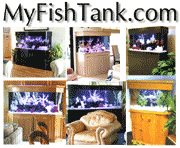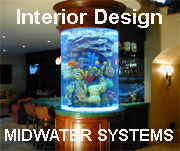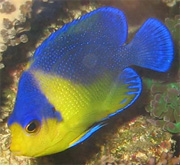|
So, you want to start a Reef Tank
?
Stands and Canopies
You have now thought about it and realized what
its going to required of you financially, effort and time wise, and you
are now ready to decide where you are going to place your Reef Tank.
Will it be in the Living room, the Den, the entryway,
or the Bedroom ? Is it going to be placed in the wall, or will it sit on
a Stand, with a Canopy ?
Probably to most important aspect to consider
at this point is Access. If it is difficult to get into the clean, change
water, repair or service, then it probably wont get done properly or on
a regular basis.
Most aquarium stands come either 24 or 30 inches
tall. Not only is the former going to be cramped space wise but it is going
to make the overall aquarium look smaller, certainly shorter.
Most people will look inside a stand and determine
that the Trickle Filter, or Sump will fit in there quite easily, but they
tend to forget that once the tubing from the overflow, and the returns
to the tanks are plumbed in there tends to be not much room left. And lets
not forget the need for the electrical cords.
Is there enough room for the pumps ? Will you
be using one or two pumps ? Additionally, if one is going to utilize a
Protein Skimmer, and its highly recommended that you do, short units are
not as efficient ( unless you select a power skimmer ) as a taller units.
Why? Because the key to a protein skimmer is contact time ( the longer
the bubble is in contact with the water
the more effectively it will drive out organics,
but that's another article ).
What about the doors on the stand ? It may be
easy to get the equipment into the stand from the backside, but what about
when its in place and the tank is filled with water, can you still remove
a piece of equipment through the front if you have to ?
Most Stand manufactures build a stand from a Carpentry
Point-of-View. They think in terms of how sturdy it needs to be and manufacturing
costs, which is what they are good at, but these manufactures are not
necessarily
users of what they build.
Which reminds me. Most Reef Tanks have an Internal
Overflow, and generally these are placed in the back corner of the tank.
Obviously one needs to drill a hole in the bottom of the overflow, and
a hole on the stand as well so the plumbing can be connect from the overflow
to the filter system. After drilling the hole in the tank and marking the
spot where the hole in
the stand needs to be drilled one then realizes
that to drill the hole in the stand you are going to end up drilling right
through the main supporting framework of the stand. OOPS !
Lets discuss canopies. A canopy sits on the top
of the tank and usually covers or hides the lighting system.
If you are using just one or two fluorescent lights
then the standard Rain Gutter looking unit is fine, but is that what you
want to look at ?
Most canopies are about 6 inches tall and sit
down, slightly dropping over the edge of the tank by about 1 inch. Think
about this for a moment, if you are using a Overflow system, where exactly
is the water level in the tank going to be ? What you want is for the canopy
to extend down past the water level point in the aquarium. Why?, because
who wants to look at the surface of the aquarium, that combined with the
fact that your lighting system is going to allow light to escape out the
front of the tank if the water level is below the canopy. Your eye should
focus on what's in the tank, not have to be shielded from light hitting
you in the eyes !
What about access into the canopy ? Most canopies
have a lid that opens half of the canopy top. This is expectable if you
are using fluorescent lighting, but how do you access the prefilter in
the overflow ? What if you are using Metal Halide Lighting ? Ever been
burned by a metal halide bulb while cleaning the tank ? It does not feel
good.
The best canopy arrangement is one where the entire
top, including the front of the canopy, lifts, or pivots, from the back
edge of the canopy, and lifts up and out of the way. This will allow the
greatest access in to the tank for cleaning, repairing, or reaching down
to the bottom of the tank ( and believe me you will need to reach down
to the bottom at some point )
Keep this in mind, the easier it is to work with,
the more often it will be done, and the more successful you will be !
|











